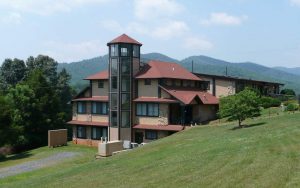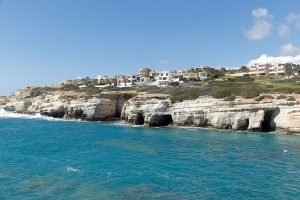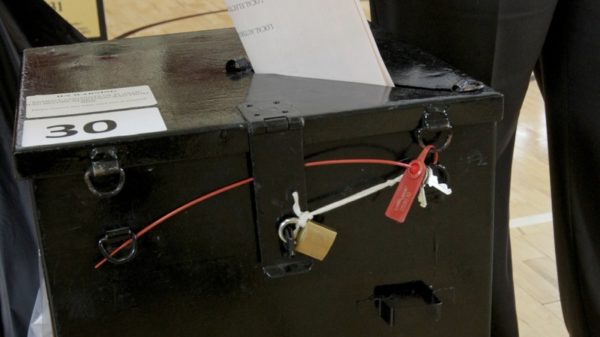Backed into politics after spending her middle age in Peyia, THEO PANAYIDES meets a town councillor who ended up in Cyprus after travelling the world and believes there is more to us than our physical bodies
From the local to the global – and beyond. Think of a satellite camera zooming out. It opens on Peyia, the small (albeit nowhere near as small as it used to be) town up the road from Coral Bay in Paphos. This is Linda Leblanc territory, Linda being, since 2006, the first and only foreign-born member of Peyia’s nine-strong town council. The camera keeps zooming out, going past Peyia to encompass the whole of Paphos, then Cyprus, then Europe, then the world (taking in Canada, where she was born – in Ottawa – in 1953). The camera looks down upon our planet, then up and away, to the infinite vastness of the universe. This too – as an outreach trainer at the Monroe Institute, a not-for-profit US institute “set up to explore human consciousness” – is Linda Leblanc territory.

Is her life compartmentalised? Does she share her spiritual exploits with the folks in the village? “Well – it’s sort of separate, shall we say,” she replies with a chuckle, chatting on Zoom from her home in Peyia. She’s soft-spoken, with a trace of a Canadian accent (‘oot’ for ‘out’, that sort of thing) still slipping in occasionally, after 40 years. “For one thing, we’re just so occupied with the here-and-now, and physical stuff going on politically in Peyia, that there’s not an awful lot of time for other stuff… But, I mean, people generally don’t ask about it, either.” Linda shrugs good-naturedly: “Y’know, you reach a point where – not everybody’s interested in this stuff. And that’s fine.”
The local is easier to describe than the global. She never intended to go into politics; “I backed into it, I guess you could say”. The catalyst was EU accession in 2004, tearing up the unspoken contract which the Cypriots of Peyia had made with themselves. “The developers did this,” says Linda sadly, speaking of the huge environmental changes she’s seen in her three decades here. “They came in, they targeted Peyia and they built these six-floor, horrible apartment blocks, in ravines and Argaki – it was just unbelievable. The local people, the council at the time, didn’t want it either. They didn’t want more than two floors… But they were overruled by the vested interests, who had their friends in Nicosia calling the shots. So we ended up with a mess.” Still, development made people rich, and after all – this was the unspoken contract – the tourists weren’t going to stay, let alone have rights. EU accession changed that, leading to an influx of EU citizens who not only stayed but could also vote in local elections; over 50 per cent of Peyia’s population is now non-Cypriot.
“There were a couple of us who’d been here a long time,” she recalls, of 2006. “We spoke a bit of Greek, and we had a connection with the community – and we realised there were a lot of problems, especially with developers cheating people. We sort of got into this from the title-deeds fiasco.” That particular mess is still ongoing, despite some quick fixes; other things have changed in 14 years, and it’s significant for instance that the current mayor – whose support among “the foreign vote” got him elected, though he has support among Cypriots too – strongly opposes a developer’s plan to build 22 villas above Coral Bay beach. The one thing that hasn’t changed is Linda’s status as the sole foreigner on the council. Is it fair to say that she got there exclusively on non-Cypriot votes?
“Well, it wasn’t ‘exclusively’, but there are very few Cypriots who’ll actually vote for us,” she admits (‘us’ being the Peyia Coalition of Independents, whom she represents). “For many reasons. I mean, the political party system is so entrenched here. And if you add that to family pressures as well…” Tourism and developers are huge in Paphos; almost everyone has family working in those fields, and votes accordingly – which is not to say that her voice is unappreciated. “A lot of Cypriots call me when they have problems. Or they’ll say, ‘Oh, I’m so glad [about] what you’re doing, we need you there fighting – we can’t do that ourselves’,” notes Linda, laying emphasis on the last sentence. “I get that all the time.”
There’s another reason why she remains the only expat in local politics. Most non-Cypriots in Peyia are retirees; many are elderly, and certainly don’t want to spend their retirement struggling to make their voice heard in council meetings. (Many decisions, even now, are eight votes to one, she laughs, with herself as the lone dissenter.) Linda also came here to retire – how she chose Cyprus is a story in itself, featuring a number of “strange synchronicities” – but she wasn’t the one retiring; that was her husband, John Knowles, who also happens to be 30 years older. Linda was still a young woman when she and John came to settle in Peyia in 1989, long before the six-storey horrors started going up; this is not the quiet-nursing-home land of her twilight years – it’s the country where she’s spent most of her life, where she grew into middle age, started exploring consciousness and trying to define her place in the world, a process that’s helped her in politics too. “I was always that shy kid in the back of the class who wouldn’t dare speak up,” she chuckles fondly. “It took me a long, long time to sort of find my voice.”
The ‘shy kid’ was born in fairly unpretentious circumstances, the second of seven (and the oldest girl) in a lower-middle-class, staunchly Catholic family. Education was meted out – along with beatings and “indoctrination” – by the priests and nuns at Catholic school; contraception was out of the question, hence the six siblings. “My poor mother had two kids in one year!” Linda herself was married at 18, but the marriage didn’t last. In her early 20s, stuck in an office job in Ottawa, she met John, who was separated from his wife; his kids (he had three) weren’t much younger than Linda herself – yet “it felt right,” she recalls. Not long afterwards, he was recruited by the UN as a trade promotion advisor and project manager, with a remit to travel the world as a permanent expat; despite the frenzied objections of friends and family, Linda followed him to Malaysia (his first posting), married him there, and they spent the next 15 years travelling the world: three years in Karachi (“I wouldn’t want to be there now!”), China, Zimbabwe, Ethiopia, Sierra Leone.
It’s worth dwelling on this for a moment – because this “odd couple” as she playfully refers to it (which might never have existed, especially given the age difference) has defined Linda’s life. She herself might consider her meeting with John to have been in some way ordained – “I don’t think things are random” is one of her credos – but it still seems remarkable. Not only did it get her out of Ottawa, and transform the working-class girl into a citizen of the world (which, again, might never have happened otherwise), but it also bestowed on her a gift seldom encountered in life: a soulmate, someone to share the journey and “grow and expand” with.
“John and I, we have… Well, there’s a lot there,” she says, with the air of trying to reduce the irreducible. “We’re together, we still love being together. One of the things we love doing is just sitting down, having a beer and talking – about the world and what’s going on, about consciousness”. Another woman might’ve worried about the 30-year gap getting in the way of having children – but Linda made her mind up long ago, haunted by the spectre of her mum’s thankless drudgery. “One of the things I took away from that,” she notes with a touch of acerbity, “is that I didn’t have any illusions about how wonderful it would be to have my own little baby. So, from an early age, I decided, ‘I have a choice in this life’, and chose not to have any children of my own this time. I have very strong memories from other lives – because we’re very interested in reincarnation – so I thought, ‘Well, it’s nice that I have a choice this time’.”
Past lives? This is where we start to approach the stuff that gets compartmentalised in her everyday life – though it also bears noting that the Monroe Institute isn’t some fly-by-night outfit; founded in 1974, it now offers courses and its own patented techniques (notably the Hemi-Sync process) to quiet the mind and help people “move into really cool states of consciousness,” as Linda puts it. “The idea,” she explains, “is that we are more than our physical bodies,” not just brain cells and random molecules but something more, part of a cosmic awareness – and talking about this stuff comes a very poor second to experiencing it, though I do wonder about the grand cosmic joke that (apparently) grants us past lives without allowing us any of the memories which might help us in this life. Linda’s reply is that we’d be overwhelmed if we could remember everything, and are therefore forced to “narrow our focus of consciousness”. Maybe.

She works as an outreach trainer for the Institute, as already mentioned. She’s also a diligent town councillor, though that cycle may be coming to an end (“I think we’ve done everything we can in Peyia, at the local level”). She also writes, and has an essay in an upcoming book called Global Warning [sic], describing her experience of chemtrails in Cyprus – a so-called conspiracy theory she takes very seriously, the fuss around 5G being another such theory (Peyia was the first council in Cyprus to refuse 5G installation unless and until “proper studies” are done). It’s perhaps no surprise, given her range of interests, that Linda is a sceptic when it comes to official narratives – especially now, with the pandemic and the way it’s curtailed our freedoms, “how easily we’ve just caved on this”.
But the threat is real, surely?
“I’m not saying it’s a hoax,” she agrees. “But I’m looking at it and thinking, ‘Well, gee, this is very convenient for a lot of stuff that we knew was being planned’. And then, how are we going to go back to normal? The virus is there. My husband is 96, is he going to be in quarantine for the rest of his life?” Then there’s the issue of surveillance. Do they plan to track us 24/7? Will we need to have immunity passports, to ensure we’re virus-free? “We’re talking about personal freedoms… There’s been a slow erosion of our freedoms over the past – oh, 15 years anyway, with these dumb phones that everyone’s addicted to.” Linda shakes her head: “And then, when you get self-appointed experts like Bill Gates telling everyone what’s going to happen… I’m very sceptical. I’m just looking at who’s benefiting, cui bono, all the time.” Her opinion of the Microsoft founder is too long to go into here, but readers are directed to a recent article on libertarian blog Zerohedge, headlined as follows: ‘Robert F Kennedy Jr. Exposes Bill Gates’ Vaccine Agenda in Scathing Report’. Yikes.
The global is harder to describe than the local; more slippery, more controversial. Better, perhaps, to stick with Cyprus – though even Cyprus gets co-opted in the freedom wars, Linda lauding “this underground fighting spirit that’s still very much alive” here (the result, she reckons, of centuries of occupation), hoping that Cyprus can remain “a little different” as the world gets surveilled and algorithmed into oblivion. Those who knew the ‘shy kid’ in Ottawa might be quite surprised by the way she’s turned out, a local politician, consciousness explorer and purveyor of a stubborn resistance in a small town on a small island – though in fact she remains quite a shy kid. She likes her yoga, long walks, the quiet life. “I think I really value being quiet”.
Peyia was quieter once; noise pollution is terrible now. It’s also very much a divided place, two quite separate communities (though they live together harmoniously enough); she’d hoped to encourage integration by standing for office in 2006, but the gulf is probably unbridgeable. A certain sadness gnaws at her sometimes – for the loss of her village, and the loss of freedom in the world, and the way so many reject the “different way of being” she’d like to see. Why are people so narrow-minded – from objecting to her own alliance with an older man at the micro level, to refusing to look beyond their physical dimension at the macro level (and remaining wedded to the old, tired model of development at the in-between, Cyprus level)? Linda shrugs: “You do what’s right for you,” she concludes. “This is something I’ve learned… I don’t base who I am on what other people think.” Local or global, she is what she is.
